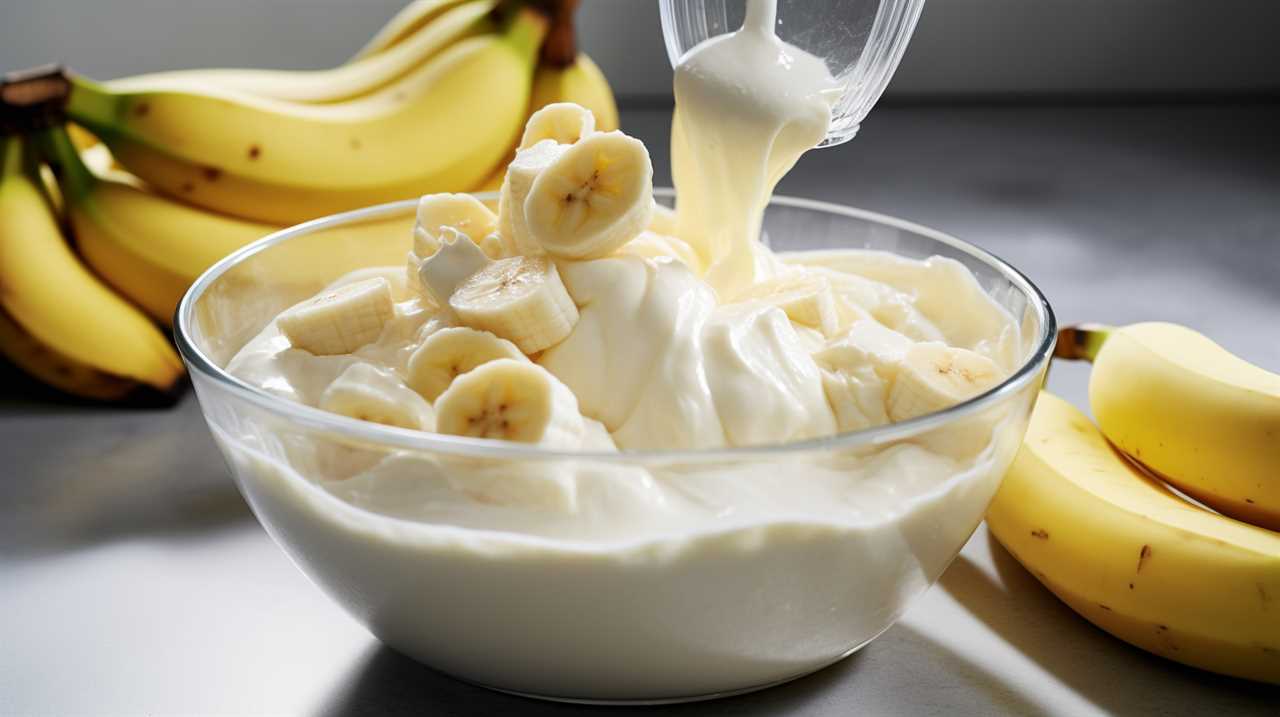Health & Nutrition
What Ice Cream Are Good for You

You might be thinking that ice cream isn’t exactly healthy, right? But, we’re here to inform you that there are, in fact, numerous tasty yet healthy ice cream choices available.
In this article, we’ll explore low-calorie choices, nutrient-rich varieties, dairy-free alternatives, sugar-free options, and even homemade and artisanal ice creams.
So, if you’re looking to satisfy your sweet tooth without compromising your health, keep reading to discover the ice creams that are good for you.
Key Takeaways
- Homemade ice cream allows for control over ingredients and can be made with natural sweeteners and organic ingredients.
- Artisanal ice cream offers higher levels of protein and calcium compared to regular ice cream and can include healthier ingredients like fruits, nuts, and dark chocolate.
- Allergen-friendly ice cream options provide customization for various allergies and intolerances, including options for vegan and lactose-intolerant individuals.
- Low-calorie ice cream options allow for portion control and moderation, and can be made with healthier alternatives like frozen yogurt or coconut milk.
Low-Calorie Ice Cream Options
We have found five low-calorie ice cream options that are good for you.
If you’re looking for a healthier alternative to traditional ice cream, consider trying healthy frozen yogurt or fruit sorbet.
Healthy frozen yogurt typically contains live and active cultures, which are beneficial for gut health. It’s lower in fat and calories compared to regular ice cream but still provides a creamy and satisfying texture.
Fruit sorbet, on the other hand, is made from pureed fruit, water, and sugar, making it a refreshing and naturally sweet treat. It’s a great option for those who are lactose intolerant or following a vegan diet.
Both options are delicious and provide a guilt-free indulgence for ice cream lovers.
Nutrient-Rich Ice Cream Varieties
To explore nutrient-rich ice cream varieties, let’s delve into options that offer a balance of delicious flavors and beneficial nutrients. When searching for healthy ice cream options, look for those made with natural ingredients to ensure you’re getting the most out of your indulgence.
Here are four nutrient-rich ice cream varieties to consider:
- Greek Yogurt Ice Cream: This creamy treat is packed with protein, probiotics, and calcium, making it a great option for a post-workout snack.
- Vegan Ice Cream: Made with plant-based milk alternatives like almond or coconut milk, vegan ice cream isn’t only dairy-free but also rich in vitamins and minerals.
- Fruit-based Ice Cream: Opt for ice cream made with real fruit, like strawberry or mango. These options provide a natural sweetness along with essential vitamins and antioxidants.
- Protein Ice Cream: With added protein powder, these ice creams are perfect for those looking to boost their protein intake while enjoying a frozen treat.
Dairy-Free and Vegan Ice Cream Alternatives
One popular option for dairy-free and vegan ice cream alternatives is almond milk ice cream. Almond milk is made by blending almonds with water and then straining the mixture to remove the solids. It has a creamy texture and a slightly nutty flavor, making it a great base for dairy-free ice cream. Almond milk ice cream is also often gluten-free, making it a suitable option for those with gluten sensitivities or celiac disease.
In addition to almond milk ice cream, there are a variety of other plant-based frozen desserts available. These include options made from coconut milk, cashew milk, and soy milk. These alternatives provide a creamy and satisfying texture, similar to traditional ice cream. Many of these plant-based frozen desserts are also available in gluten-free varieties, catering to individuals following a gluten-free diet.
Sugar-Free and Diabetic-Friendly Ice Cream Choices
When it comes to sugar-free and diabetic-friendly ice cream choices, there are several options that can be enjoyed by those seeking healthier alternatives. Here are four options to consider:
- Sugar substitutes: Many sugar-free ice creams use sugar substitutes such as stevia, erythritol, or monk fruit extract. These alternatives provide sweetness without affecting blood sugar levels.
- Artificial sweeteners: Some diabetic-friendly ice creams use artificial sweeteners like aspartame or sucralose. These sweeteners have little to no impact on blood sugar levels and can be a suitable option for those with diabetes.
- Low glycemic index ingredients: Ice creams made with low glycemic index ingredients like almond milk or coconut milk can be a good choice for people with diabetes. These ingredients have a slower impact on blood sugar levels.
- Portion control: It’s important to remember that even sugar-free or diabetic-friendly ice creams should be consumed in moderation. Paying attention to serving sizes can help maintain blood sugar levels and overall health.
Homemade and Artisanal Ice Cream Options
Now let’s delve into the realm of homemade and artisanal ice cream options, continuing our exploration of healthier alternatives. When it comes to homemade ice cream, one popular option is homemade gelato. Made with natural ingredients and less air, gelato is often lower in fat and calories than traditional ice cream. Additionally, it tends to have a smoother and denser texture, making it a delightful treat. Artisanal ice cream shops also offer a wide array of flavors, including seasonal fruit options. These flavors allow you to indulge in the refreshing taste of fruits like strawberries, peaches, and watermelon, while still enjoying a creamy and satisfying dessert. Below is a table highlighting some homemade and artisanal ice cream options:
| Homemade Gelato | Seasonal Fruit Flavors |
|---|---|
| Pistachio | Strawberry |
| Hazelnut | Peach |
| Dark Chocolate | Watermelon |
With homemade and artisanal ice cream options, you can indulge in delicious flavors while making healthier choices.
Frequently Asked Questions
Can Low-Calorie Ice Cream Options Still Satisfy My Sweet Tooth?
Low-calorie ice cream options can still satisfy our sweet tooth. While they have lower sugar content, we can enhance the flavor by adding healthy toppings like fresh fruits, nuts, or a drizzle of dark chocolate.

Are There Any Nutrient-Rich Ice Cream Varieties That Are Also Low in Calories?
Low sugar ice cream options can be healthy and satisfying. We’ve found nutrient-rich ice cream brands that are also low in calories. They’re a guilt-free way to indulge our sweet tooth.
What Are Some Popular Dairy-Free and Vegan Ice Cream Alternatives?
Popular dairy-free and vegan ice cream alternatives are widely available. Many brands offer gluten-free options as well. These alternatives provide a tasty and satisfying treat for those who have dietary restrictions or prefer plant-based options.
Are There Any Sugar-Free Ice Cream Choices That Are Suitable for Diabetics?
There are sugar-free ice cream options that are suitable for diabetics. One example is a brand called Halo Top, which offers a variety of diabetic-friendly frozen treats with low sugar content.
How Can I Make Homemade Artisanal Ice Cream Without an Ice Cream Maker?
Making homemade artisanal ice cream without an ice cream maker is possible. We have found some delicious recipes and discovered tips for achieving a creamy texture. It’s a fun and rewarding process to try at home!
Can Ice Cream be a Healthy Breakfast Option?
While unconventional, some argue that ice cream for breakfast can be a healthy option. As long as it’s made with natural ingredients and eaten in moderation, it can provide essential nutrients and energy to kick-start the day. Pair it with fruit and nuts for added benefits.
Conclusion
In conclusion, while there are many delicious ice cream options to choose from, it’s important to consider your individual dietary needs.
Low-calorie options can be a good choice for those watching their weight, while nutrient-rich varieties provide added health benefits.
Dairy-free and vegan alternatives cater to those with dietary restrictions, and sugar-free options are ideal for diabetics.
Finally, homemade and artisanal ice cream can offer a unique and indulgent treat.
Remember to enjoy ice cream in moderation as part of a balanced diet.
Beyond the realm of flavor and technique, Adriano recognizes the importance of sustainability and conscious consumption. His writing often explores eco-friendly practices within the ice cream industry, highlighting the use of locally sourced ingredients, reducing waste, and supporting ethical production methods.
Health & Nutrition
The Scoop On Frozen Yogurt Vs. Ice Cream: Which Is Healthier For Your Waistline?

Definition Of Frozen Yogurt And Ice Cream
Frozen yogurt and ice cream are both cold, creamy desserts that can satisfy a sweet tooth. However, they have some key differences when it comes to health benefits. Frozen yogurt is made from fermented dairy products like milk or cream and contains active cultures of bacteria which provide probiotics – beneficial microorganisms that help support digestive health. It usually has less fat than traditional ice cream but more sugar. Ice cream, on the other hand, is traditionally made with heavy cream and egg yolks for added richness. This makes it higher in calories and saturated fats than frozen yogurt, though there are now many lighter versions available. When considering their impact on your waistline, one important factor to consider is portion size. Generally speaking, frozen yogurt tends to be lower in calories per serving compared to regular ice-cream due to its base ingredients as well as reduced fat content. So if you’re looking for a healthier option without sacrificing flavor, opt for smaller portions of frozen yogurt instead of larger servings of traditional ice cream. It’s also worth noting that while both desserts contain similar amounts of carbohydrates and protein, the type of carbohydrates found in each vary greatly. While most of the carbs in ice cream come from refined sugars, those found in frozen yogurts are mostly composed of natural sugars such as lactose and fructose. This means that frozen yogurts may have fewer negative effects on blood glucose levels compared to sugary ice creams – making them better options for people trying to watch their weight or manage diabetes symptoms.Nutritional Differences
When looking at the nutritional differences between frozen yogurt and ice cream, it’s important to consider both the macro-nutrients (carbs, proteins and fats) as well as the micro-nutrients (vitamins, minerals and other compounds). In terms of calories per serving, frozen yogurts tend to be lower than traditional ice cream – usually about 70-100 fewer calories for a 1/2 cup serving. In terms of carbs, both desserts contain similar amounts but the type varies greatly. While most of the carb content in ice creams is from refined sugars, those found in frozen yogurts are mostly composed of natural sugars like lactose and fructose which may have fewer negative effects on blood glucose levels. Protein content is also similar in both treats – with regular ice cream having slightly higher protein content due to its milk or cream base. When it comes to fat content, there’s a clear winner: frozen yogurt typically has less fat than traditional ice cream due to its lighter ingredients. But keep in mind that not all types of frozen yogurt are created equal; some varieties can actually be just as high in saturated fats as their full-fat counterparts. So make sure you read the nutrition labels before indulging!Calorie Count
It’s no secret that when trying to maintain a healthy diet and waistline, calorie count plays an important role. For those watching what they eat, frozen yogurt may seem like the obvious choice – but is it really? To answer this question, let’s take a look at how these two desserts compare in terms of calories. We can think of our caloric intake as ‘calories-in’ versus ‘calories-out’, or the number of calories we consume compared to the amount burned through physical activity. In general, traditional ice cream has more calories per serving than its healthier counterpart; however, if you choose to indulge in low fat frozen yogurts (with 0 – 2% milkfat), you can still enjoy your favorite treat with fewer guilt-inducing calories. The bottom line: when it comes to making smarter decisions about dessert for your health and waistline, both regular ice creams and frozen yogurts can be enjoyed in moderation. Just make sure to read labels carefully and always opt for lower fat options whenever possible!Fat Content Comparison
When it comes to fat content, the difference between frozen yogurt and ice cream becomes much clearer. While traditional ice creams are typically made with a combination of cream and whole milk, most brands of frozen yogurt contain skim or low-fat dairy products like 1% or 2% milk. This means that regular ice cream is naturally higher in calories due to its high fat content, while low fat frozen yogurts offer more health benefits without sacrificing taste. Furthermore, when selecting your dessert choice, it’s important to consider any added ingredients such as chocolate chips or nuts – these often add extra fat and sugar which can significantly increase the calorie count. On the other hand, some frozen yogurts may be labeled ‘no sugar added’– meaning they have fewer calories and less of an impact on your waistline than their sugary counterparts. At the end of the day, choosing one over another really depends on personal preference and dietary goals. If you’re looking for something lower in fat but still sweet and delicious, then opt for a low-fat frozen yogurt; if you prefer something richer and indulgent, then go for a scoop (or two)of classic ice cream! Whatever you choose, remember that balance is key – so enjoy your treat responsibly!Health Benefits
When it comes to health benefits, frozen yogurt and ice cream have some differences. On the one hand, a single serving of traditional ice cream can contain as much as 14 grams of fat – almost twice that of most low-fat frozen yogurts! Additionally, since many brands use artificial sweeteners like sucralose or stevia in place of sugar, frozen yogurts tend to have less added sugars than their counterparts. This makes them an ideal choice for those who want to satisfy their sweet tooth without overindulging in empty calories. Surprisingly, certain types of frozen yogurt may even offer additional nutritional perks. For instance, some manufacturers add probiotic cultures such as Lactobacillus acidophilus during the production process which helps support digestion and gut health. Plus, many varieties come loaded with vitamins A & D and calcium – all key components for strong bones and teeth! TIP: Check labels when you’re at the store so you know exactly what’s inside your dessert before indulging. Opting for plain flavors is also a great way to cut down on added sugars while still enjoying the taste – just make sure to choose something high in protein or fiber if possible!Frequently Asked Questions
What Is The Difference Between Store-Bought And Homemade Frozen Yogurt And Ice Cream?
When it comes to frozen yogurt and ice cream, there are two main types: store-bought and homemade. Store-bought items tend to have more fat content than the DIY versions since they often include added creams or flavorings. On the other hand, making your own means that you can control how much sugar and fat goes into each batch. The nutritional value of these treats will depend largely on the ingredients used in their recipes. For instance, if you choose low-fat milk for either type of dessert, then it’ll be lower in calories compared to full-fat dairy products. Additionally, most store-bought varieties contain preservatives and stabilizers that could affect their overall healthiness as well. Finally, when deciding between frozen yogurt vs ice cream for a healthier waistline option, consider what kind of indulgence makes sense for your lifestyle and dietary needs. If you’re looking for something sweet but not overly caloric, stick with a lighter frozen yogurt made with natural ingredients like fruit or honey. Alternatively, if you’re after intense creamy texture and taste, opt for an all-natural brand of premium ice cream without any artificial flavors or additives.How Long Can I Store Frozen Yogurt And Ice Cream In My Freezer?
Storing frozen yogurt and ice cream in the freezer can be a tricky proposition. Like so many things, it’s a delicate balance between keeping your treats safe from spoilage while still making sure they remain deliciously indulgent! To that end, one must ask: How long can I store frozen yogurt and ice cream in my freezer? Like most of life’s sweetest mysteries, this question requires some investigation to answer. The unfortunate truth is that there isn’t one specific answer for all types of frozen desserts. Generally speaking, both homemade and store-bought varieties will last anywhere from two weeks up to three months depending on how well you package them. That said, if you want top quality results when it comes time to dig into your favorite treat, freezing any type of dessert for longer than six weeks could result in an icy texture or off flavors. The key takeaway here is timing – make sure you enjoy your creations as soon as possible after taking them out of the freezer! If done correctly, storing frozen yogurt and ice cream doesn’t have to leave a bitter taste in your mouth – quite literally. After all, who would turn down their chance at deliciousness? So go forth and freeze with confidence knowing when the right moment arrives you’ll be ready to savor every spoonful without worry.Are There Sugar-Free Options Available For Frozen Yogurt And Ice Cream?
Are there sugar-free options available for frozen yogurt and ice cream? People with diabetes or those who are looking to reduce their sugar intake have this question in mind. Fortunately, the answer is yes. There are a variety of low-sugar and no-sugar alternatives for these two popular desserts. The most straightforward option is to look for brands that contain artificial sweeteners instead of regular sugar. These products can be found at most stores and provide an easy way to enjoy a treat without consuming excessive amounts of added sugars. For example, many brands offer light versions of both frozen yogurt and ice cream that use aspartame or sucralose instead of traditional sugar. For those who prefer not to consume artificial ingredients, natural sweetener alternatives such as stevia, honey, agave nectar, monk fruit extract, and coconut palm syrup can also be used to create delicious treats without overwhelming sweetness. Additionally, some manufacturers even offer completely unsweetened versions that rely on other flavors like fresh fruits or nuts to add flavor without adding any additional calories or carbohydrates from added sugars. No matter what type of dessert you’re looking for, there are plenty of ways to satisfy your cravings while still managing your health goals – all it takes is being mindful about the kind of ingredients you choose when selecting frozen yogurt or ice cream!What Are Some Healthy Toppings To Add To Frozen Yogurt And Ice Cream?
When it comes to frozen yogurt and ice cream, adding some healthy toppings can make a difference. Topping your favorite desserts with fresh fruits and nuts not only adds flavor but also provides important nutrients that are beneficial for overall health and waistline goals. Here’s what you need to know about how to maximize the nutritional value of these delicious treats. For starters, look for low-calorie toppings like berries, kiwi, apples or bananas. These fruits provide natural sweetness without added sugar while supplying essential vitamins and minerals such as Vitamin C and potassium. Nuts are another great topping option because they boast protein and fiber which help keep you feeling full longer. Walnuts, almonds, pistachios or hazelnuts all work well in this regard. If you’re looking for something crunchy yet still healthy, try sprinkling on unsweetened coconut flakes or sunflower seeds. Both contain monounsaturated fats that have been linked to cardiovascular benefits when eaten in moderation. Additionally, granola is a popular choice if you want a bit more texture – just be sure to check the label before purchasing as many varieties contain high amounts of added sugars which may defeat the purpose of trying to eat healthily! With creative combinations of nutritious ingredients available, there’s no limit to how flavorful your frozen yogurt or ice cream treat can be – whether you prefer savory or sweet flavors. So don’t feel guilty about indulging in dessert every now and again; by making wise topping choices you’ll be able to enjoy an enjoyable snack while keeping your waistline happy too!What Are The Environmental Impacts Of Making Frozen Yogurt And Ice Cream?
When considering the environmental impacts of making frozen yogurt and ice cream, it’s important to look at both production processes. From water usage and carbon emissions associated with manufacturing dairy products, to packaging materials that could be recyclable or non-recyclable – there are many factors to consider when determining the overall environmental impact. Let’s take a closer look: • Water Usage – Dairy processing requires significant amounts of clean water for pasteurization and sanitation purposes. • Carbon Emissions – Milk processing can generate large quantities of carbon dioxide due to milk fermentation and other chemical reactions involved in producing the finished product. • Packaging Materials – Products such as cups, lids, spoons, straws, etc., may require single-use plastics or paperboard containers depending on how they will be sold/dispensed. • Energy Consumption – Both processes use a lot of energy in terms of cooling systems during production as well as refrigeration afterwards. • Waste Management – Proper waste disposal measures must be taken in order to prevent contamination from entering local water sources or landfills when disposing of excess product or packaging material. All these elements have an effect on the environment and should be taken into consideration by producers who want to reduce their business’ ecological footprint. By understanding each step within the process, companies can make informed decisions about what methods are best suited for their particular needs while also helping protect our planet long term.What Are the Health Benefits of Frozen Yogurt Compared to Ice Cream?
Frozen yogurt is often viewed as one of the most nutritious options for ice cream because it has reduced fat and calorie content in contrast to conventional ice cream. It is also rich in live and active cultures that may enhance gut health. Moreover, it tends to have a lower sugar content, positioning it as a healthier alternative for dessert.
Conclusion
In conclusion, when it comes to frozen yogurt versus ice cream, there are a few key factors that can help you decide which is healthier for your waistline. While store-bought products may have added sugar and preservatives, homemade options provide more control over the ingredients used. Furthermore, knowing how long different types of treats can be stored in the freezer helps ensure they remain fresh and safe to eat. With sugar-free alternatives becoming increasingly available, those looking to cut down on calories without sacrificing taste now have more options than ever before. Finally, consider adding healthy toppings such as fruit or nuts instead of candy or syrups – this will add flavor while helping reduce overall calorie intake. Whether you choose frozen yogurt or ice cream as part of a balanced diet, both offer unique benefits and flavors that make them enjoyable snacks!Beyond the realm of flavor and technique, Adriano recognizes the importance of sustainability and conscious consumption. His writing often explores eco-friendly practices within the ice cream industry, highlighting the use of locally sourced ingredients, reducing waste, and supporting ethical production methods.
Health & Nutrition
The Big Question: Can You Really Have Ice Cream For Breakfast Instead Of Cereal?

Overview Of Breakfast Alternatives
Breakfast is often considered the most important meal of the day, yet many people struggle to find something that works for them. Cereal has long been a popular breakfast choice because it’s easy to prepare and can be eaten quickly on busy mornings. However, there are plenty of alternatives out there that offer more variety and nutrition than traditional cereal options. In this article, we’ll explore some of these other breakfast foods and discuss whether or not you can really have ice cream for breakfast instead. For those looking for an alternative to cereal, yogurt is an excellent option. It provides protein, calcium, and probiotics—all essential elements of a healthy diet. Many yogurts come in fun flavors too, so you don’t have to sacrifice taste when choosing healthier food options. Additionally, oatmeal is another great choice if you’re trying to avoid sugary cereals but still want something tasty and satisfying. Oats contain dietary fiber which helps keep your digestive system running smoothly while providing necessary energy throughout the morning hours. Finally, let’s get back to the original question: can you really have ice cream for breakfast? While having ice cream as part of your regular morning routine may not be ideal from a health perspective, it certainly isn’t impossible either! An occasional scoop of your favorite flavor can make for a delicious treat without breaking any nutritional rules. Just remember to balance it out with other nutritious choices like fruits and vegetables whenever possible.Nutritional Benefits Of Ice Cream
The mere thought of ice cream for breakfast can bring a smile to anyone’s face. Imagining the rich, creamy texture and indulgent flavors sends our taste buds into overdrive. But beyond its decadent flavor, did you know that ice cream has some surprising nutritional benefits? Let’s start with calcium. Ice cream is an excellent source of this important mineral which helps build strong bones and teeth. It also contains phosphorus, another essential nutrient that plays a role in maintaining healthy cells, tissues, and organs. In addition to these minerals, dairy-based ice creams are packed with protein—an ideal way to jumpstart your day! Finally, there’s good news when it comes to fat content too: many brands offer lower calorie options made from skim milk or low-fat yogurt bases so you don’t have to worry about consuming too much saturated fat each morning. So if you’re looking for something special as part of your breakfast routine every once in awhile, why not indulge in a scoop? With all the wonderful advantages it provides nutritionally, enjoying ice cream for breakfast isn’t such a bad idea after all!Health Concerns Of Eating Ice Cream For Breakfast
With all the nutritional benefits of eating ice cream for breakfast, it’s no wonder so many people are tempted to give it a try. But before diving into that pint of Rocky Road, there are some health concerns to consider. For starters, while dairy-based ice creams do contain important nutrients like calcium and protein, they also tend to be higher in sugar than traditional breakfast foods such as cereal or oatmeal. Consuming too much added sugar can lead to weight gain and chronic illnesses like diabetes—so if you choose to enjoy an icy treat in the morning, moderation is key! Additionally, those who are lactose intolerant should avoid starting their day with dairy products—especially since ice cream takes longer to digest than other items on the typical breakfast menu. This could cause uncomfortable bloating and gas during the day. It’s best for individuals with dietary restrictions to opt for non-dairy alternatives made from coconut milk or almond milk instead. No matter what type of ice cream you decide to have for breakfast, make sure it fits within your overall daily nutrition goals. If done correctly, a scoop or two can provide essential vitamins and minerals that help kickstart your day off right!Tips On How To Enjoy Ice Cream Responsibly In The Morning
Now that you understand the potential health concerns associated with consuming ice cream for breakfast, it’s time to learn how to enjoy this sweet treat in a responsible way. Here are some tips on making sure your morning indulgence is still healthy and nutritious: • Balance out sugar content: If you’re having dairy-based ice creams, try pairing them with other breakfast items like yogurt or oatmeal to help even out their added sugar content. You can also opt for lower-sugar varieties such as sorbet or frozen fruit bars instead. • Include protein and fiber: To make up for the lack of protein and fiber found in traditional breakfast foods, add toppings like nuts, seeds, granola, or dried fruits to your ice cream bowl. This will help keep you feeling full longer throughout the day! • Make it an occasional treat: While there’s nothing wrong with enjoying a scoop of ice cream every now and then, it should not be an everyday occurrence. Eating too much sugary food first thing in the morning can lead to spikes in blood sugar levels—so save it for special occasions instead. These simple steps can help ensure that your early morning indulgences don’t come at the expense of your overall nutrition goals. Remember; moderation is key when it comes to eating any type of food—especially those higher in sugar like ice cream!Summary Of Alternatives To Cereal For Breakfast
For those looking for a break from the traditional cereal breakfast, there are plenty of alternatives that can make mornings more exciting. From healthy smoothie bowls to savory omelets, here’s a summary of some delicious—and nutritious—options: Smoothie Bowls – Start your day off right with a nutrient-packed smoothie bowl! Simply blend up your favorite fruits and vegetables with a liquid base such as almond milk or coconut water and pour into a bowl. Top with granola, chia seeds, nuts, or other tasty toppings for an extra crunch. Overnight Oats – If you’re short on time in the morning but still want something warm and filling, overnight oats are the way to go. Just combine rolled oats, Greek yogurt, nut butter (if desired), chia seeds, sweetener of choice (such as honey or agave nectar), and any additional add-ins like dried fruit or dark chocolate chips in a jar before bedtime—then enjoy chilled in the morning! Avocado Toast – This classic breakfast is sure to satisfy both savory and sweet cravings alike. Slice up some avocado onto whole wheat toast and sprinkle it with salt, pepper, red pepper flakes, garlic powder…or whatever spices you prefer. Add an egg if desired for added protein! These simple yet creative options prove that cereal doesn’t have to be your only source of breakfast nourishment. With so many possibilities out there for indulging responsibly without compromising nutrition goals—enjoying ice cream once in awhile may just become part of your regular routine after all!Frequently Asked Questions
What Type Of Ice Cream Is Best For Breakfast?
When it comes to having ice cream for breakfast, the type of ice cream that you choose can be just as important as your decision to have a sweet treat in the morning. There are many different types available on the market today; each has its own unique flavor profile and texture that could make or break your breakfast experience. If you want something light and airy, sorbet is an excellent choice. Sorbets typically contain less fat than traditional ice creams, so they won’t weigh you down after eating them. They also come in a variety of flavors, including fruity ones like raspberry and mango which would pair nicely with cereal and other breakfast foods. Another popular option for those looking for some sweetness in their morning meal is gelato. Gelato has more intense flavors compared to regular ice cream due to its higher milk content; this makes it perfect for people who love rich and creamy desserts. Plus, with all of the different toppings available these days – from chocolate sprinkles to crushed cookies – there’s no limit to how creative you can get when making your own “breakfast sundae”! No matter what type of ice cream you choose for your breakfast, don’t forget to enjoy yourself while indulging in this special treat – even if it’s not usually part of your normal routine!Are There Any Vegan Ice Cream Options?
Are there any vegan ice cream options? With the rise of plant-based diets, more and more people are seeking out vegan alternatives to their favorite foods. Ice cream is no exception. Thankfully, for those looking for a dairy-free option, there are now several brands offering delicious vegan ice creams that taste just as good – if not better – than traditional varieties. Vegan ice creams come in all sorts of flavors, from classic chocolate and vanilla to inventive new creations like blackberry cobbler or coconut chai swirl. They also can be made with different bases, such as almond milk, oat milk, cashew milk, or even avocado! This means that everyone can find a flavor they love while still staying true to their dietary needs. These days it’s easier than ever to enjoy an indulgent bowl of creamy vegan ice cream for breakfast without compromising on your values or preferences. Whether you’re eating it straight from the pint or turning it into a decadent smoothie bowl topped with fresh fruit, granola, and cacao nibs – vegan ice cream opens up endless possibilities for healthy breakfasts packed with nutrition and flavor.Are There Other Breakfast Alternatives That Are Healthier Than Ice Cream?
When it comes to breakfast, there are more alternatives than just cereal and ice cream. If you’re looking for something healthier than ice cream, consider the many options available. Fruits, eggs, oatmeal, yogurt, smoothies – all of these provide plenty of nutrients with fewer calories. Plus, they also offer a wide range of flavors and textures that can be combined together in creative ways. If you want to get even more creative with your breakfasts, try making overnight oats or chia pudding. This option is great because it requires minimal effort but still provides lots of vitamins and minerals that help keep you energized throughout the day. You can also add other ingredients like nuts and seeds to increase the nutritional value. Even if time is an issue in the morning, it’s easy to make healthy grab-and-go meals like energy bars or homemade granola that will sustain you until lunchtime. For those who love their dairy products but don’t necessarily want ice cream every morning, look into alternative sources such as nut milks or plant-based yogurts made from coconut milk or almond milk. These substitutes come packed with protein and fiber while retaining some sweetness so that your breakfast doesn’t feel too deprived! TIP: Don’t forget about savory options either; whole grain toast topped with avocado slices makes for a delicious meal full of healthy fats and complex carbohydrates!What Type Of Toppings Work Best With Ice Cream For Breakfast?
A tantalizing thought takes hold – ice cream for breakfast? It’s an idea that can make mouths water and stomachs rumble, but it begs the question: what type of toppings work best with ice cream to make a delectable morning meal? The possibilities are endless. There is no limit to the delicious combinations one could create when combining creamy goodness with different flavors. From sprinkles, nuts, chocolate chips, or even crushed candy bars, each topping has its own unique flavor and texture that pairs perfectly with ice cream. Then there are syrups and sauces like caramel or strawberry which add sweetness in just the right amount for breakfast. With all these options at hand, anyone can craft their own custom bowl of icy delights fit for any time of day! It may sound strange to eat something usually associated with dessert first thing in the morning, but why not enjoy a bit of indulgence once in awhile? Ice cream has been around since ancient times as a treat enjoyed by royalty so why shouldn’t we be able to experience that same pleasure ourselves? So go ahead and choose your favorite combination; you’ll have everyone talking about your creative ideas over breakfast!Can Ice Cream Be Part Of A Balanced Breakfast?
Can ice cream be part of a balanced breakfast? It’s an intriguing question that many people may find themselves asking. After all, it’s not the typical morning meal we would traditionally think of. But with more and more people looking for alternatives to their traditional breakfasts, could this sweet treat really make the cut? When it comes to adding ice cream to your breakfast routine, there are several things to consider. Nutritional value is one factor; you want something that will give you energy but also provide essential vitamins and minerals. Another aspect to keep in mind is portion size – too much can lead to excess calories and sugar intake. Also, what type of toppings or mix-ins work best with your favorite flavor? All these questions must be taken into account when deciding if ice cream can fit into a well-balanced diet. So long as you pay attention to the nutritional aspects involved, having some ice cream for breakfast isn’t so farfetched after all! Moderation is key here: just like any other food item consumed during the day, portions should be kept under control so as not to overdo it on fats and sugars. With careful consideration given towards which flavors or ingredients are used, this seemingly outlandish idea just might become reality!Is Eating Ice Cream for Breakfast a Healthy Choice and Why Do You Like it?
Consuming ice cream as a morning meal might not be the best option for health, given its high sugar and fat content. Nevertheless, its smooth consistency and sweetness make it a favorable choice for many. The habit of enjoying ice cream at the start of the day is often linked to the comfort and pleasure it provides. This explains the appeal of ice cream.
Conclusion
In conclusion, the debate of whether or not ice cream is an acceptable breakfast food may never be resolved. While some people view it as a fun and delicious way to start their day, others see it as unhealthy and lacking in nutritional value. Ultimately, the decision comes down to personal preference and what works best for each individual’s lifestyle. Regardless of one’s opinion on the matter, there is no denying that having ice cream for breakfast can add a little excitement and pleasure to your morning routine. The combination of creamy ice cream with toppings like fresh fruit, crunchy nuts and sweet syrup makes this treat both indulgent and nutritious – a perfect coincidence! Furthermore, vegan-friendly options are available so everyone can enjoy a guilt-free bowl of goodness first thing in the morning. At the end of the day, it is up to you to decide if you want cereal or ice cream for breakfast – either way you should make sure your meal leaves you feeling energized and ready to tackle whatever challenges await during your busy day ahead!Beyond the realm of flavor and technique, Adriano recognizes the importance of sustainability and conscious consumption. His writing often explores eco-friendly practices within the ice cream industry, highlighting the use of locally sourced ingredients, reducing waste, and supporting ethical production methods.
Health & Nutrition
Ice Cream: Surprising Health Benefits Revealed

Ice Cream Good For You
It’s widely recognized that ice cream is one of the most delicious treats you can find.
But did you know that it can also be good for your health?
That’s right – not only is ice cream a source of energy and a great stress reliever, but it can also provide nutritional benefits like improved immunity, heart health, and even better sleep!
Plus, with proper portion control, you can enjoy this sweet treat while still maintaining a healthy weight.
In this article, let’s take a look at all the ways that ice cream can benefit your body and mind.
Nutritional Benefits
Ice cream can offer some surprising nutritional benefits, so don’t be too quick to pass it up! Ice cream’s energizing properties make it a great source of energy after physical activities, like running and biking. It contains carbohydrates for fuel as well as fat and protein for longer-lasting energy.

In addition to providing an instant burst of energy, ice cream is also packed with vitamins and minerals that can help improve the skin’s health. For instance, ice cream made from whole milk contains vitamin A which helps reduce wrinkles and boost cell growth. It also has calcium which is beneficial in reducing acne inflammation.
The high fat content found in many types of ice cream makes it a good source of healthy fats such as monounsaturated fatty acids (MUFAs) and polyunsaturated fatty acids (PUFAs). These types of fats are essential for normal body functioning because they provide the body with energy, better nutrient absorption, and help maintain hormonal balance.
Ice cream can be enjoyed without guilt if one keeps their portions under control and selects flavors that are lower in sugar content or opts for healthier ingredients like nuts or fruit pieces. Hence, when consumed responsibly, this tasty treat can be quite nutritious—allowing people to enjoy all its deliciousness while still staying healthy!
Source of Energy
Consuming ice cream as an energy source can provide you with a boost of energy, yet it should be enjoyed in moderation. Ice cream can satisfy your body’s energy needs and help to improve your metabolism rate due to its carbohydrate content.
Here are some benefits that make it ideal for an energy source:
- It’s easily digested and absorbed into the bloodstream, providing almost instant energy.
- It contains natural sugars that are healthier than other refined sugar sources.
- Its creamy texture satiates hunger cravings quickly and without causing bloating or discomfort.
The proteins and fats found in ice cream also contribute to its nutritional value, making it a better choice for those looking for an alternative energy source than processed snacks. Additionally, although fat and calories are higher in ice cream than many other snack options, they still remain lower overall when compared to sugary candy bars or chips filled with preservatives.
Lastly, the variety of flavors makes it easy to find one that everyone enjoys without having to resort to junk food alternatives just for a quick burst of energy – aiding in digestion along the way!
Aid in Digestion
Enjoying ice cream can help to aid in digestion, providing a smooth transition for your body’s energy needs while satisfying hunger cravings. Ice cream is typically high in fat, which helps to slow down the digestion process and provide longer lasting fullness.
When consumed as part of a balanced diet with healthy alternatives that meet dietary requirements, ice cream can be an excellent source of nutrition and enjoyment. Research has indicated that when enjoyed in moderation, some varieties of lower-fat ice creams may even contain probiotics that are beneficial for gut health; helping to boost the good bacteria within the digestive system and improve overall wellbeing.
For those looking for heart health benefits from their frozen treat, there are plenty of options available on store shelves today. Many manufacturers have come out with healthier versions containing natural ingredients like honey and fruit purees as sweeteners instead of sugar, along with plant-based milks as a dairy alternative or reduced-fat milk blends.
With so many delicious flavors now available that don’t skimp on taste, it’s easier than ever before to find a nutritious option that also satisfies your sweet tooth cravings.
From aiding digestion to offering heart health benefits, there’s no doubt that everyone should be able to enjoy the occasional scoop or two without guilt – just make sure it fits into an overall balanced diet plan.
Going forward, consider trying out some new flavorful combinations by using unique toppings like nuts or dried fruits for added texture and flavor!
Heart Health
Experience the heart health benefits of ice cream by trying out some new flavorful combinations. You can top it with crunchy nuts and sweet dried fruits for a tasty treat that’s also good for your heart!
Studies have shown that eating a moderate amount of low-fat ice cream can help lower cholesterol levels, improve cardiovascular health, and reduce the risk of heart disease. Here are five science-backed reasons why eating ice cream is beneficial for your heart:
- Eating moderate amounts of dairy products such as ice cream can help increase good HDL cholesterol, which helps prevent clogged arteries.
- Eating one to two servings per week can help maintain healthy blood pressure levels.
- The calcium in frozen treats helps keep your bones strong and reduces inflammation in the body.
- The fiber content found in many types of ice cream can reduce bad LDL cholesterol levels.
- Eating quality sources of whole milk fat may contribute to improved metabolic health markers.
The key is to enjoy indulging in delicious treats without going overboard – moderation is key! And thanks to all the research showing how beneficial eating a little bit of ice cream can be for our hearts, it’s easier than ever to feel good about treating ourselves every now and then.
Stress Relief
Indulging in a scoop of ice cream can be a great way to reduce stress and give yourself a much-needed moment of relaxation. Eating the right kind of food can help us manage our emotions better, and many studies show that certain foods can trigger the release of neurotransmitters in the brain that have calming effects.
Ice cream has been found to contain significant levels of L-tryptophan, an amino acid which helps to boost serotonin production – a hormone associated with relaxation and happiness. Additionally, ice cream is also high in calcium which helps regulate emotional balance.
Studies have shown that when faced with stressful situations or activities, having a small portion of ice cream can help you stay calm and focused. Eating comfort foods like ice cream releases endorphins into your system which induce feelings of pleasure and satisfaction. This reinforces good behavior through positive reinforcement, resulting in improved moods as well as increased motivation when it comes to tackling challenging tasks.
Making sure you get enough restful sleep is key for reducing stress and ensuring emotional balance throughout the day – something that eating some indulgent ice cream before bedtime can definitely help with! Eating sweet treats such as frozen desserts triggers the release of hormones such as dopamine which are known to improve our overall mood. This makes having some comforting dessert after dinner an ideal way to relax for those looking for alternatives to traditional relaxation techniques like yoga or meditation.
With proper portion control, making room for a scoop (or two) every now and then won’t hurt your health goals either! Moving on from stress relief, let’s look at how eating some delicious ice cream could act as a mood booster…
Mood Booster
Eating ice cream can be a great way to lift your spirits and put a smile on your face, while tantalizing your taste buds with its delightful sweetness. Mindful eating is the key to enjoying this treat in a healthy manner.
Not only does it promote mindful living, but it also has powerful effects on improving mental well-being. Research suggests that consuming ice cream triggers the release of endorphins and serotonin in the brain – hormones that help us relax and improve our moods. Studies have also found that adding small amounts of ice cream into a balanced diet can help boost overall happiness levels.
But it’s important not to overindulge when it comes to this frozen treat. Eating too much ice cream can lead to weight gain, therefore it’s best to enjoy it in moderation as part of an otherwise healthy diet. If you’re looking for ways to incorporate more of this sweet snack into your life without going overboard, opting for healthier alternatives such as sorbets or vegan options is recommended.
The benefits associated with mindful consumption of ice cream go beyond just feeling good – improved immunity is another positive outcome resulting from proper portion control and choosing healthier options when possible. So take the time to savor each bite and enjoy the deliciousness that comes along with this frozen delight!
Transitioning into improved immunity is easy when done mindfully – all you have to do is listen to what your body’s telling you and make conscious decisions about how much you’re consuming or substituting unhealthy ingredients for better ones whenever possible.
Improved Immunity
By controlling your portion size and selecting healthier options, you can enjoy the benefits of improved immunity while still indulging in a treat. Ice cream is made with milk which contains vitamins A and D, which are both important for keeping the immune system functioning properly. In addition to these vitamin boosts, consuming ice cream in moderation has been linked to reduced inflammation levels – something that can help fight off illnesses throughout the year.
Numeric lists are an excellent way to add depth and complexity to any writing on this topic:
- Vitamin A helps your body produce white blood cells, helping it fight infection and disease more effectively.
- Vitamin D plays a role in maintaining healthy immunity by regulating cell growth and increasing antimicrobial peptides within the body.
- Lowering inflammation can help reduce the risk of developing chronic diseases such as heart disease or diabetes as well as reducing symptoms of existing conditions like arthritis or asthma.
- The calcium found in many types of ice cream may also boost immunity by strengthening bones and teeth, providing another layer of protection against illness-causing bacteria or viruses entering through weakened areas of defense.
In addition to these positive effects on immunity, incorporating ice cream into a balanced diet plan with mindful portions can provide an enjoyable reward after meals while still achieving overall health goals set out for yourself – no matter what they may be! Whether enjoyed alone as a special treat or shared with friends during social gatherings – there’s no doubt that ice cream has earned its place among other nutritious snacks when consumed in moderation.
Improved Memory
Consuming ice cream in moderation can not only be beneficial for immunity, but it may also lead to improved memory through its calcium content. As an essential mineral for brain functioning, calcium helps promote mental clarity and focus that often dissipates due to brain fog associated with chronic stress or fatigue. The following table provides a breakdown of some nutritional benefits found in a single serving of ice cream:
| Nutrient | Amount | % Daily Value |
|---|---|---|
| Calcium (mg) | 107mg | 11% |
| Protein (g) | 4g | 8% |
| Carbohydrates (g) | 15g | 6% |
This data reveals how one scoop of ice cream contains more than 10 percent of the daily recommended amount of calcium for adults. Furthermore, this same portion size provides 8 percent protein and 6 percent carbohydrates that help replenish energy levels after physical exertion. While the small amounts of sugar and fat should be taken into consideration when determining calorie intake, there’s no denying that moderate consumption offers positive health benefits related to improved cognitive abilities and sharper memories. Transitioning into the next section on sleep benefits, studies have shown that eating certain foods before bedtime can improve overall quality of restful slumber.
Improved Sleep
Indulging in a scoop of ice cream before bedtime can help you drift off to dreamland with its sleep-promoting nutrients. Ice cream is rich in several vitamins and minerals, including:
- Vitamin A for the production of melatonin, a hormone that helps regulate sleep cycles
- Magnesium which relaxes muscles and nerves
- Calcium which boosts serotonin levels to promote relaxation
- Protein which increases tryptophan levels for improved restful sleep
These nutrients work together to reduce stress hormones like cortisol while increasing natural hormones like serotonin. This helps create an enjoyable sense of calmness that will lull you off into a deep slumber.
Improved sleep can also lead to better brain development and better concentration. With regular consumption, ice cream may be just the thing needed to get adequate rest every night and feel refreshed when morning comes.
Weight Management
Making smart choices when it comes to ice cream can help you maintain your weight goals. With a variety of low-calorie options available, adding a scoop or two of ice cream to your diet does not mean compromising on taste or health. In fact, careful selection of the right type of ice cream could even be beneficial for weight management.
For those looking to stay slim and fit, focusing on balanced diets and regular exercise plans is the key. Ice cream that is lower in fat and sugar content can provide essential nutrients like calcium and protein while satisfying cravings without taking in too many calories. Moreover, certain types of low calorie ice creams are also fortified with dietary fiber which helps support digestion and promote satiety after having a sweet treat.
Overall, indulging in an occasional bowl of carefully selected ice cream can satisfy sweet tooth cravings without ruining your health goals. To enjoy delicious flavors without worrying about increasing waistlines, make sure to choose the right kind of low calorie desserts that contain fewer carbohydrates and fats but still offer the same amount of flavor as traditional varieties!
Frequently Asked Questions
What types of ice cream are best for health benefits?
Choosing the right kind of ice cream can be important for maintaining healthy eating habits. Not all ice creams are equal when it comes to nutrition, so it’s important to consider factors like sugar content and ingredients before making a selection.
Low-fat or light ice cream is a popular option for those looking to reduce calorie intake. Natural or organic varieties may provide more nutrition overall. If seeking a sweet treat with health benefits, frozen yogurt can be an excellent alternative that provides calcium and probiotics in addition to indulgent flavor.
Ultimately, it’s up to you to find an ice cream that meets your dietary needs and satisfies your taste buds.
Are there any specific brands of ice cream that are recommended?
I’m sure you’ve asked yourself, are there any specific brands of ice cream that are recommended for health benefits? Well, the answer is yes!
While it’s true that no ice cream is really ‘good’ for you, some brands contain less sugar and more natural ingredients than others. For example, many popular brands use artificial sweeteners and preservatives to make their products taste sweeter and last longer on shelves.
However, if you’re looking for something a bit healthier then look no further than premium artisanal ice creams with low sugar content and made with natural ingredients. Not only will your taste buds thank you but so will your body as these healthier options have fewer calories and often don’t contain additives or preservatives.
So go ahead – indulge in the creamy goodness of a delicious treat without feeling guilty about it!
Are there any health risks associated with eating ice cream?
Eating ice cream can have both positive and negative health implications, depending on the fat content and sugar intake. Too much of either can increase your risk for developing heart disease or diabetes. However, if consumed in moderation, some types of ice cream may provide certain essential nutrients such as calcium and protein.
Ultimately, it’s important to research the exact contents of different brands before indulging to ensure you make an informed decision about what kind of impact it’ll have on your overall health.
Are there any vegan alternatives to ice cream?
I’m always looking for ways to make delicious treats that are both vegan and healthy, so I was excited to find out there are plenty of dairy-free substitutes for traditional ice cream.
From simple ingredients like bananas and avocados, to more complex vegan recipes with unique flavors, the possibilities are truly endless.
Not only do these dairy-free alternatives provide a delicious treat without any animal products, but they also offer an innovative way to get creative in the kitchen.
With countless recipes available online from experienced chefs, it’s easy to find a vegan ice cream alternative that will satisfy your cravings.
Are there any additives or preservatives in ice cream that could be harmful?
When it comes to ice cream, many people are concerned about the additives and preservatives that may be included. While there’s no definitive answer, some of the most common ingredients used include dairy alternatives such as soy or almond milks, sugar substitutes such as stevia or monk fruit extract, and preservatives like potassium sorbate.
These ingredients could potentially be harmful if consumed in large amounts over a long period of time. However, evidence suggests that when eaten in moderation, they can actually help preserve the quality of your ice cream while making it healthier for you overall.
Conclusion
It’s clear that ice cream can be part of a healthy diet when enjoyed in moderation. Not only does it provide some essential nutrients, but it can also help boost energy levels and aid digestion. Plus, its calcium content is great for heart health and stress relief.
What’s more, regular consumption has been linked to improvements in immunity, memory, sleep quality, and weight management. So if you’re looking for a sweet treat with some potential health benefits – look no further than the humble scoop of ice cream!
With its multitude of nutritional benefits, this delicious indulgence could be your secret weapon to feeling healthier and happier.
Beyond the realm of flavor and technique, Adriano recognizes the importance of sustainability and conscious consumption. His writing often explores eco-friendly practices within the ice cream industry, highlighting the use of locally sourced ingredients, reducing waste, and supporting ethical production methods.
-

 Beginners Guides2 weeks ago
Beginners Guides2 weeks agoCreamy Remedies: Good Ice Cream Choices for Acid Reflux Relief
-

 Beginners Guides2 weeks ago
Beginners Guides2 weeks agoHow to Do When Your Ice Cream Tastes Gritty: Quick Fixes
-
Beginners Guides1 week ago
10 Differences Between Ice Cream and Popsicles
-

 About Ice Cream1 month ago
About Ice Cream1 month agoWhat Military Diet Rules Allow Ice Cream?
-

 Creative Ice Cream Recipes2 weeks ago
Creative Ice Cream Recipes2 weeks agoWho Makes Dairy Queen Ice Cream
-

 About Ice Cream1 month ago
About Ice Cream1 month ago10 Reasons Why You Feel Like Throwing Up When You Eat Ice Cream
-

 About Ice Cream1 month ago
About Ice Cream1 month agoHow Pouring Milk on Ice Cream Causes Ice Crystals
-

 About Ice Cream1 hour ago
About Ice Cream1 hour agoWhat Makes Ice Cream Essence Essential in Creamy Treats?



















